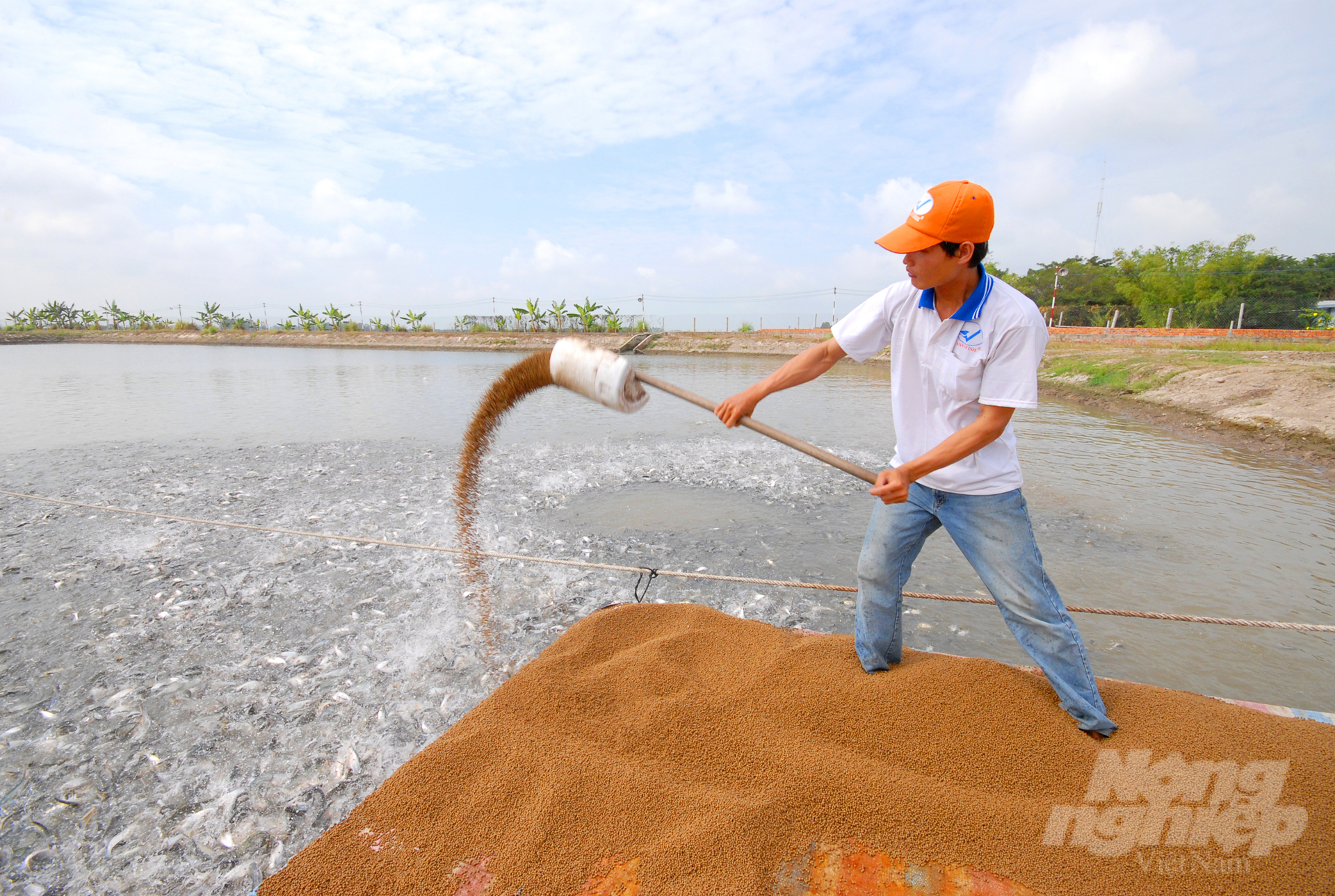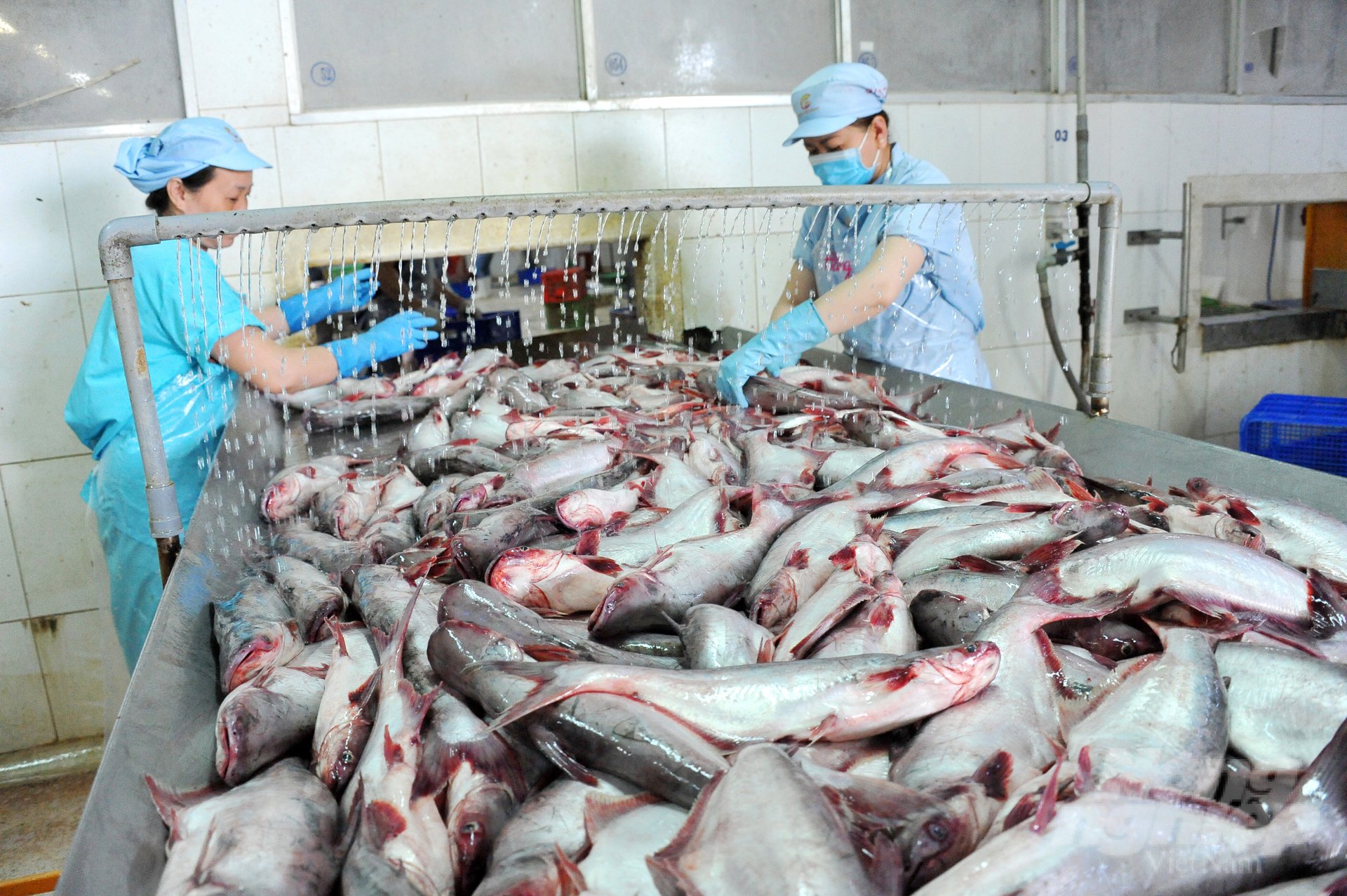May 30, 2025 | 20:14 GMT +7
May 30, 2025 | 20:14 GMT +7
Hotline: 0913.378.918
May 30, 2025 | 20:14 GMT +7
Hotline: 0913.378.918

Pangasius is primarily farmed in the Mekong Delta region with an annual production area of approximately 6,000 hectares and a yield of over 1.5 million tons. Photo: Le Hoang Vu.
Over the years, the pangasius industry has developed into a leading seafood export sector in Vietnam. Vietnamese pangasius products are currently available in over 140 global markets, with exports bringing in more than 2.4 billion USD in 2022. Vietnam's main areas for pangasius farming, which span approximately 6,000 hectares, are concentrated in the Mekong Delta region, namely in the provinces of An Giang, Dong Thap, Can Tho, Ben Tre, and Vinh Long.
Most notably, various sustainable economic models are encouraged by local governments and the Directorate of Fisheries to apply advanced technologies in pangasius farming, processing, preservation, and transportation. The aim of this initiative is to reduce post-harvest losses, save input materials, encourage research and production of value-added products from by-products to reduce emissions and optimize resource utilization.
The Directorate of Fisheries under the Ministry of Agriculture and Rural Development, in collaboration with Can Tho city's Department of Agriculture and Rural Development and the Vietnam Pangasius Association, organized a workshop titled "Public-Private Cooperation in Seafood Processing - Circular Economy, Emission Reduction in the Pangasius Chain in Vietnam" in Can Tho city.
According to Ms. Pham Thi Thu Hong, Deputy Secretary-General of the Vietnam Pangasius Association, pangasius is farmed in soil ponds using primarily industrial feed. However, the distribution of production areas is not centralized, primarily comprising of businesses, cooperatives, and small-scale household farms. Furthermore, the existing infrastructure that serves these farms exhibits a lack of standardization and uniformity.
Studies indicate that achieving an average pangasius yield between 200 and 250 tons per hectare requires a minimum amount of feed 320 tons and a discharge of approximately 256 tons of organic matter into the environment. With a production yield of 1.5 million tons, a major challenge for pangasius farming regions is the treatment of wastewater, which is currently predominantly conducted through water exchange, biological products, and sludge removal. Only a small number of production areas have adopted modern technology in response to this challenge.

The seafood processing industry and the environmental protection plan for the fisheries sector for the 2021-2030 period have identified that achieving an economic circular model is one of the key objectives to foster sustainable growth. Photo: Le Hoang Vu.
According to Ms. Hong, local governments must develop detailed plans for aquaculture areas with an emphasis on separate water supply and drainage systems. Subsequently, stakeholders must aim to establish concentrated pangasius production areas as well as expand advanced, circular, and resource-recovering pangasius farming models. Furthermore, enhanced control of the quality of broodstock, fingerling, feed, and disease control is necessary to minimize environmental impact.
In addition, there is a need to promote industrial investment in processing by-products to increase the value of the industry's product chain. Processing companies must prepare and implement social responsibility as the key factor in enhancing the competitiveness of Vietnam's fisheries sector.
On the other hand, environmental protection helps reduce the cost of pangasius farming. Mr. Tran Dinh Luan, General Director of the Directorate of Fisheries, noted that the pangasius industry in the Mekong Delta region has created numerous employment opportunities for local residents and contributed significantly to the country's socio-economic development. However, despite the achievements, Vietnam's pangasius industry faces limitations in terms of production, processing, environmental management, supply chain, and consumption. Consequently, the industry must reorganize production, manage input and output factors, reduce greenhouse gas emissions to protect the environment, optimize production cost, and raise product quality to meet market demand.
According to Mr. Luan, the pangasius and seafood processing industry needs to comply with the "Fisheries Environmental Protection Plan from 2021 to 2030." Accordingly, the plan aims to build and develop circular and green economic models to protect the environment and ensure sustainable development.

For the sustainable development of the catfish industry, environmental protection is a critical factor. Photo: Le Hoang Vu.
The Private-Public Partnership in Aquaculture, established by the Minister of the Ministry of Agriculture and Rural Development in 2020, is a voluntary and sustainable partnership between private sector, which includes entities involved in investment, production, trading, and service provision within the seafood production chain, and the public sector, which includes relevant governmental agencies. The Directorate of Fisheries issued a decision in 2022 to approve the formation of six subgroups, one of which is dedicated to the pangasius industry.
The Directorate of Fisheries emphasizes that public-private partnership is an effective approach to the sustainable development of the pangasius industry with a focus on promoting circular economy. Namely, the partnership offers the opportunity to foster equal connections that align with the capacities and needs of participants. Thanks to the partnership, management agencies at all levels and businesses within the supply chain can engage in scientific research and development efforts.
"With the help of workshops and related activities, the pangasius industry has garnered increased attention and received extensive investment in terms of quality and quantity from involved stakeholders. Governmental bodies including associations, businesses, and research institutions need to collectively assess the challenges facing the pangasius industry. Additionally, it is essential to analyze the strengths and weaknesses as the pangasius industry adopts a circular economy model. This analysis serves as the foundation to propose technologically advanced solutions that promote energy efficiency and emissions reduction within the supply chain. These efforts aim to facilitate the sustainable development of the pangasius industry," concluded Mr. Tran Dinh Luan.
Translated by Nguyen Hai Long

(VAN) Several scientists and farmers are experimenting with soil treatment in some key durian-growing regions such as Cai Lay (Tien Giang), Dak Song, Gia Nghia, and Dak R’lap (Dak Nong).
/2025/05/25/4127-3-073637_820.jpg)
(VAN) Thanks to the promotion from an FAO-implemented project, vegetable production in greenhouses in Moc Chau has seen strong development, from 1.5 hectares in 2021 to nearly 50 hectares in 2024.

(VAN) FAO has recently supported USD 140,000 to implement the project 'Risk mitigation human-animal interface risks through disease control initiatives in pig farming.'

(VAN) The People's Committee of Tra Vinh province has approved an adjustment to the investment policy for the Green Hydrogen Plant project, increasing its area to approximately 52.76 hectares.
![Reducing emissions from rice fields: [2] Farmers’ commitment to the soil](https://t.ex-cdn.com/nongnghiepmoitruong.vn/608w/files/news/2025/05/05/dsc08881jpg-nongnghiep-140632.jpg)
(VAN) Clean rice cultivation model in Thuong Tan commune, Bac Tan Uyen district, is assisting local residents in achieving sustainable agriculture by substantially reducing costs, increasing productivity, and protecting the environment.

(VAN) At the conference to disseminate Resolution No. 68, AgriS introduced its digital agricultural ecosystem and reaffirmed its commitment to accompanying the Government in promoting private sector development and sustainable agriculture.

(VAN) 'Blue Ocean - Blue Foods' initiative is designed to restore marine ecosystems and establish sustainable livelihoods for local communities by cultivating a minimum of 1,000 hectares of cottonii seaweed in the first three years.